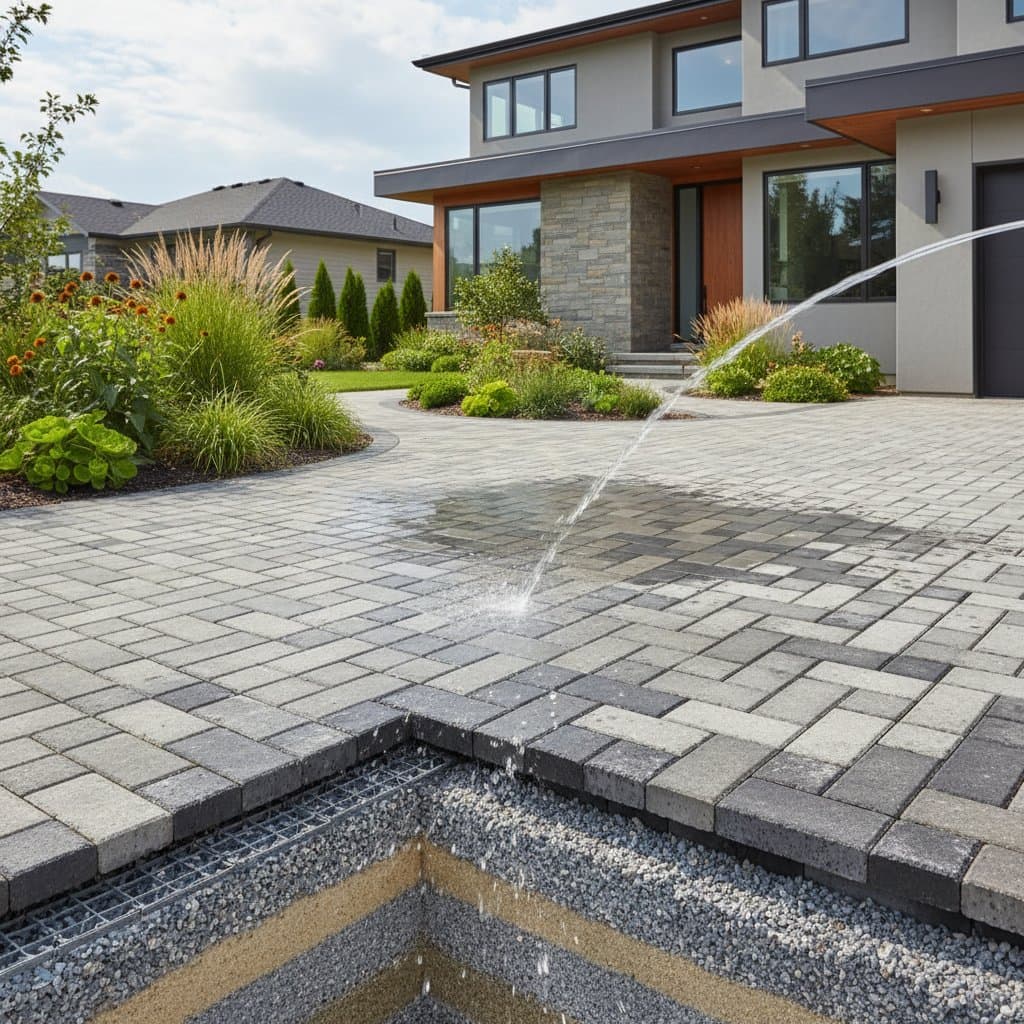Understanding the Shift to Permeable Pavers
Permeable pavers represent a innovative approach to stormwater management, allowing water to infiltrate through joints into an underlying stone reservoir. This design contrasts with impermeable surfaces like traditional concrete or asphalt, which direct runoff into storm drains and increase flood risks. As environmental concerns grow, eight states have enacted regulations requiring permeable pavers for certain projects, aiming to restore natural water cycles and reduce urban pollution.
These mandates typically apply to new developments, driveways, parking areas, and public spaces where impervious cover exceeds specified thresholds. By adopting permeable systems, communities address issues such as eroded stream banks, contaminated waterways, and overwhelmed sewer systems. Property owners benefit from enhanced site resilience and compliance with evolving building codes.
Key Benefits of Permeable Pavers
Permeable pavers offer multiple advantages beyond regulatory adherence. They effectively filter pollutants from rainwater, preventing them from entering local water bodies. This filtration supports healthier ecosystems and complies with federal clean water standards.
In addition, these systems recharge groundwater supplies, which proves vital in areas facing water scarcity. Reduced surface runoff also lowers the demand on municipal infrastructure, potentially decreasing utility fees for residents. Aesthetically, permeable pavers provide versatile designs that blend functionality with landscape appeal.
Installation Challenges and Solutions
Proper installation forms the foundation of a permeable paver system's success. Several challenges arise during this process, yet they can be managed with expertise.
- Accuracy and Slope Control: Even slight grading errors can prevent proper drainage or cause puddling.
- Material Handling: The stone base material proves heavy and requires uniform compaction.
- Long-Term Performance: Improper installation can lead to clogging or uneven settling, reducing infiltration capacity.
Hiring a certified installer ensures that the system meets local regulations and performs effectively for decades. Professionals conduct site-specific assessments to address soil types, climate conditions, and load requirements from the outset.
Costs and Long-Term Value
Permeable paver installation involves a higher initial expense compared to standard concrete or asphalt options. Property owners typically pay between ten and twenty dollars per square foot for professional installation, influenced by factors such as material selection, site preparation, and design intricacy.
This elevated cost offsets through various savings over time. It diminishes expenses related to stormwater management fees, drainage repairs, or erosion mitigation efforts. Certain municipalities provide rebates or tax credits for permeable surfaces that lessen runoff into public systems.
The durability of permeable pavers further enhances their value. Individual units allow replacement without overhauling the entire surface area. Their flexible structure resists cracking during freeze-thaw cycles, extending service life in variable climates.
Maintenance Essentials for Permeable Pavers
Routine maintenance keeps permeable pavers functioning optimally with minimal effort.
- Vacuum or blow debris off the surface regularly to prevent clogging.
- Inspect joints annually and refill with clean aggregate if necessary.
- Avoid sealing or coating the surface, as this blocks infiltration.
- Check for sediment buildup after heavy storms, and remove it promptly.
- Keep nearby vegetation trimmed to prevent organic matter from filling joints.
With consistent care, these systems endure as long as or longer than conventional pavements, maintaining both performance and appearance.
Choosing a Qualified Contractor
Selecting an experienced contractor proves essential for regulatory compliance and sustained results. Seek specialists in permeable hardscapes who demonstrate familiarity with state-specific stormwater rules.
Pose these key questions prior to engagement:
- Are you certified to install permeable pavement systems?
- Will you perform soil and infiltration testing?
- How will you ensure the system meets local stormwater codes?
- What type of base materials and aggregates will you use?
- What maintenance schedule do you recommend after installation?
A competent contractor delivers thorough responses and supplies documentation throughout the project phases.
Common Homeowner Questions About Permeable Pavers
Do I Need a Permit to Install Permeable Pavers?
In regulated states, permits become necessary for installations impacting stormwater flow. The application process generally requires a drainage plan or infiltration test results to verify system efficacy.
Can Permeable Pavers Handle Heavy Vehicles?
Correct design and installation enable permeable pavers to support substantial loads. The stone base layer delivers strong bearing capacity, suitable for driveways, fire lanes, and light commercial parking.
Do Permeable Pavers Freeze in Winter?
Permeable pavers outperform traditional surfaces in cold weather. Water infiltration prevents surface pooling and ice buildup, while a well-engineered base avoids frost heave issues.
How Long Do Permeable Pavers Last?
Regular maintenance allows most systems to function for several decades. Damaged individual pavers permit targeted repairs, simplifying upkeep compared to monolithic concrete or asphalt.
Are Permeable Pavers Environmentally Friendly?
These systems promote environmental health by reducing runoff, filtering pollutants, recharging aquifers, and preserving natural water balances. Municipalities often recognize them as integral green infrastructure elements.
Do Permeable Pavers Increase Property Value?
In regions emphasizing sustainable features, permeable installations elevate property appeal. They signal modernity, compliance, and ecological responsibility, while improving visual curb presence.
Can I Retrofit Existing Hardscapes with Permeable Pavers?
Retrofitting demands excavation and base layer reconstruction for adequate infiltration. A professional evaluation assesses site suitability and outlines necessary modifications.
Implementing Permeable Pavers for Lasting Compliance
State mandates for permeable pavers underscore a broader commitment to sustainable stormwater practices. Homeowners gain improved drainage, waterway protection, and property enhancement through these installations. The initial investment yields returns in durability, adherence to codes, and environmental stewardship.
If regulations apply in your area or loom on the horizon, proactive planning positions you advantageously. Grasp the operational principles of these systems and collaborate with skilled professionals to achieve a compliant, attractive landscape that endures.
Contact a reputable local hardscape specialist to assess permeable paver solutions tailored to safeguard your property and support ecological balance.
